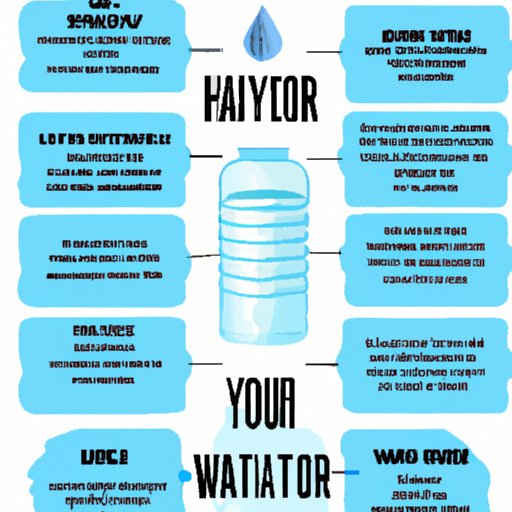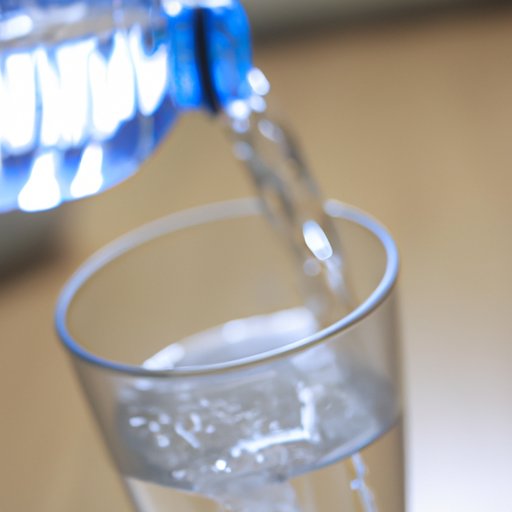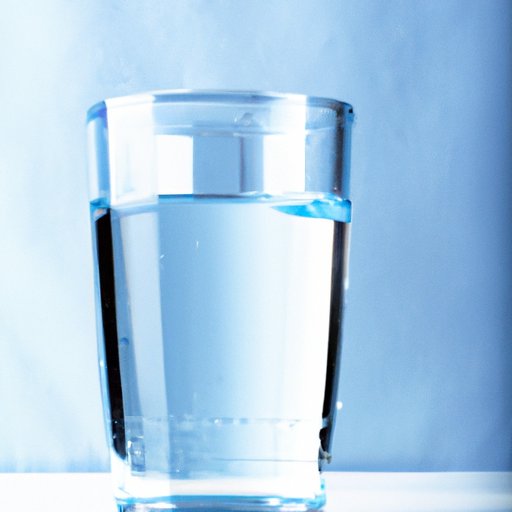Introduction
Staying hydrated is essential for optimal health and wellbeing. But how much water should you be drinking each day? It’s a question that many of us have asked ourselves, yet it can be difficult to find a definitive answer.
In this article, we’ll explore the importance of knowing how much water to drink each day. We’ll look at the benefits of staying hydrated, provide a guide to understanding your daily water intake, and discuss tips on how to make sure you’re drinking enough water every day. We’ll also cover the potential risks of drinking too little or too much water.

Benefits of Knowing How Much Water to Drink Each Day
Knowing how much water to consume each day can help ensure that you’re staying properly hydrated. Adequate hydration can have a wide range of health benefits, including improved energy levels, better digestion, and more efficient weight management. Let’s take a closer look at some of the benefits of knowing how much water to drink each day.
Improved Hydration
Drinking enough water can help keep your body adequately hydrated. This is important because your body needs water to function properly. When you become dehydrated, your body struggles to perform basic tasks such as regulating your temperature, carrying oxygen to your cells, and flushing out toxins.
Increased Energy Levels
Staying properly hydrated can also help boost your energy levels. Dehydration can cause fatigue, headaches, and muscle cramps. By drinking enough water, you can help ensure that your body has the energy it needs to get through the day.
Better Digestion
Drinking the right amount of water can also help improve your digestion. Water helps to break down food and carry nutrients to your cells. Without enough water, your digestion can become sluggish and inefficient.
More Efficient Weight Management
Finally, drinking enough water can also help with weight management. Water is an essential part of any weight loss plan, as it can help to reduce hunger and cravings. Additionally, drinking water before meals can help you feel fuller faster, which can aid in portion control.

A Guide to Hydration: Understanding How Much Water You Need to Consume Each Day
The amount of water you need to drink each day depends on several factors, such as age, activity level, gender, and environment. Here’s a guide to understanding your daily water intake.
Factors That Influence Daily Water Intake
Age: The amount of water you need to drink each day may change as you age. For example, infants and young children typically need more water than adults do.
Activity Level: Your activity level can also influence your daily water intake. If you’re exercising regularly, you’ll need to drink more water to replace what is lost through sweat.
Gender: Men generally need to drink more water than women do because they tend to have higher body mass and sweat more.
Environment: The environment you live in can also affect your daily water intake. If you live in a hot climate, you’ll need to drink more water to avoid dehydration.
Calculating Your Daily Water Intake
The general rule of thumb is to drink eight 8-ounce glasses of water per day. However, this may not be enough for everyone. To calculate your individual needs, multiply your body weight (in pounds) by 0.5. This will give you the number of ounces of water you should be drinking each day.

Staying Healthy by Drinking the Right Amount of Water
Drinking the right amount of water can help ensure that your body is functioning optimally. Here are some of the benefits of drinking the right amount of water.
Improved Kidney Function
Drinking enough water can help improve kidney function. Water helps to flush out waste products and toxins from the body, which can reduce the risk of kidney stones and other kidney-related issues.
Reduced Risk of Dehydration
Staying hydrated can also help reduce the risk of dehydration, which can lead to a variety of unpleasant symptoms such as headaches, dizziness, and fatigue.
Improved Cardiovascular Health
Additionally, adequate hydration can help improve cardiovascular health. Water helps to regulate blood pressure, which can help protect against heart disease and stroke.
Enhanced Cognitive Performance
Finally, drinking enough water can also help enhance cognitive performance. Being dehydrated can impair your ability to focus and concentrate, so drinking the right amount of water can help keep your brain sharp and alert.
Tips on How to Make Sure You’re Drinking Enough Water Every Day
Here are some tips on how to make sure you’re drinking enough water every day.
Carry a Refillable Water Bottle
Investing in a reusable water bottle can help make it easier to stay hydrated throughout the day. Having a water bottle nearby can serve as a reminder to drink up.
Set Reminders
Setting reminders can also be helpful. You can set reminders on your phone or computer to remind yourself to drink water throughout the day.
Add Flavor to Your Water
If plain water isn’t your thing, try adding some flavor to it. You can add slices of citrus fruit or herbs such as mint or basil to give your water a refreshing taste.
Eat Water-Rich Foods
Eating water-rich foods can also help you stay hydrated. Fruits and vegetables such as cucumbers, watermelon, strawberries, and celery are all high in water content.
Monitor Your Urine Color
Finally, monitoring your urine color can help you determine if you’re drinking enough water. If your urine is pale yellow or clear, then you’re likely drinking enough water. If it’s dark yellow or orange, then you may need to drink more.
How Drinking Too Little or Too Much Water Can Affect Your Health
Drinking too little or too much water can have negative effects on your health. Here are some of the risks associated with drinking too little or too much water.
Risks of Drinking Too Little Water
Dehydration: Not drinking enough water can lead to dehydration, which can cause a variety of unpleasant symptoms such as headaches, dizziness, and fatigue.
Kidney Stones: Not drinking enough water can also increase the risk of developing kidney stones.
Constipation: Dehydration can also lead to constipation.
Fatigue: Dehydration can cause fatigue, which can make it harder to stay active and productive throughout the day.
Risks of Drinking Too Much Water
Hyponatremia: Drinking too much water can also be dangerous. Consuming too much water can dilute the sodium levels in your blood, which can lead to hyponatremia.
Swelling: Drinking too much water can also cause swelling in the hands, feet, and face.
Nausea: Overhydration can also cause nausea and vomiting.
Confusion: Drinking too much water can also lead to confusion and disorientation.
Conclusion
In conclusion, it’s important to know how much water to drink each day in order to stay healthy and hydrated. Drinking the right amount of water can have numerous health benefits, such as improved energy levels, better digestion, and more efficient weight management. It’s important to find the right balance for optimal health.
(Note: Is this article not meeting your expectations? Do you have knowledge or insights to share? Unlock new opportunities and expand your reach by joining our authors team. Click Registration to join us and share your expertise with our readers.)
